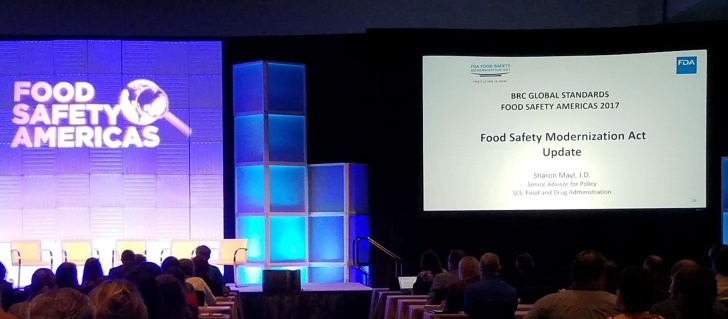Sessions Gems from BRC’s Food Safety Americas 2017

Alchemy headed to the British Retail Consortium’s Food Safety Americas conference April 4-5 in Orlando to network and learn more about the ongoing challenges and emerging opportunities in the fight for food safety. The conference agenda was packed with excellent presentations as usual. Here are some of the highlights:
Deirdre Schlunegger, CEO of STOP Foodborne Illness, gave the keynote address and discussed her organization’s collaboration with the California Leafy Green Food Handler Marketing Agreement (LGMA). She shared statistics suggesting that over a ten-year period, 30,000 people will have lost their lives to foodborne pathogens. She advocated several approaches to helping ensure food safety is a top priority for food companies, including creating what she called a “link between the head and the heart of food industry employees” to drive the culture of food safety.
Schlunegger shared an emotional video of a meeting between LGMA staff and people who had lost relatives to foodborne illnesses. LGMA members delineated the produce industry’s response, including a dramatic increase in focus on food safety. One example: LGMA members have ramped up employee training around food safety and foodborne illness prevention.
David Brackston, BRC Technical Director, discussed BRC’s Food Safety Culture module that can be added to food safety audits. The module includes a food safety culture questionnaire for employees at every level of an organization. The questionnaire generates a report to provide organizational insight regarding food safety culture in four key areas: people, processes, purpose, and proactivity. The report is intended to help organizations benchmark their culture and shine a light on areas in need of improvement. One key dimension within the critical ‘people’ category is employee empowerment, including an emphasis on teamwork, training, and reinforcement, all of which strongly influence the other key focus areas.
Christy Pepple, Talent and Skill Development Analyst for Ardent Mills, emphasized cascading Preventive Controls knowledge all the way down to the frontline employee level. Ardent Mills has 40 locations, each site featuring at least three Preventive Controls Qualified Individuals, clearly illustrating a dedication to food safety.
Dr. Glenn Morris of the Emerging Pathogens Institute at the University of Florida presented research on the growing numbers of multi-antibiotic-resistant bacteria, including methicillin-resistant staphylococcus aureus and MRSA. He warned that the prevalence of antibiotic-resistant bacteria is reaching “critical” levels in hospitals, and stressed that the food industry needs to raise its awareness of this issue to better understand the role our own operations play in controlling the spread of such pathogens. Dr. Morris stated that developments will continue to unfold as more research and focus is directed at this growing challenge.
Sharon Birkett, VP of Food Protection and Quality at OSI, shared an awesome mock recall scenario her company regularly executes. OSI engages their employees in the mock recall process by creating realistic food safety crisis scenarios and assigning specific roles to their employees including acting as media personnel simulating urgent media inquiries and consumer roles simulating picketing individuals in response to mock reports of illnesses resulting from consumption of their product. OSI develops the scenario and performs these mock recalls every two years.
By placing their employees in these more realistic crisis situations, OSI helps employees better understand the critical nature of their work. They emerge with both a greater awareness of the serious food safety issues that can arise and the urgency with which they must be addressed. OSI, meanwhile, can test the robustness and overall effectiveness of its recall and communication plans.
Steve Parker, Associate Director of Global Quality and Food Safety for Mondelez, provided deep insight into the 2006 salmonella contamination of Cadbury’s chocolates, going beyond discussion of the £1 million fine for knowingly distributing salmonella-contaminated chocolates and the additional £20+ million to recall the products and address problems at Cadbury’s Herefordshire, UK plant.
Parker said the effect on the plant culture was horrific—sales declined dramatically, employees lost their jobs, and careers were ruined. As the company reached out to employees, workers shared that they had informed the management team about problems, but that “management wasn’t listening.”
To remedy such communication disconnects, management has developed “Effective Quality Discussions” (EQDs). Supervisors are now trained to engage their employees in these discussions and actively listen and respond to employees’ feedback. The results of such discussions have included an increase in the number of quality issues reported, in part because of employees feeling they are free to share concerns with impunity. The company has also experienced what Parker describes as a “significant” reduction in consumer complaints. Parker’s conclusion? Engaging employees is key to a strong food safety culture!
We look forward to more fruitful discussions at next year’s BRC conference!





